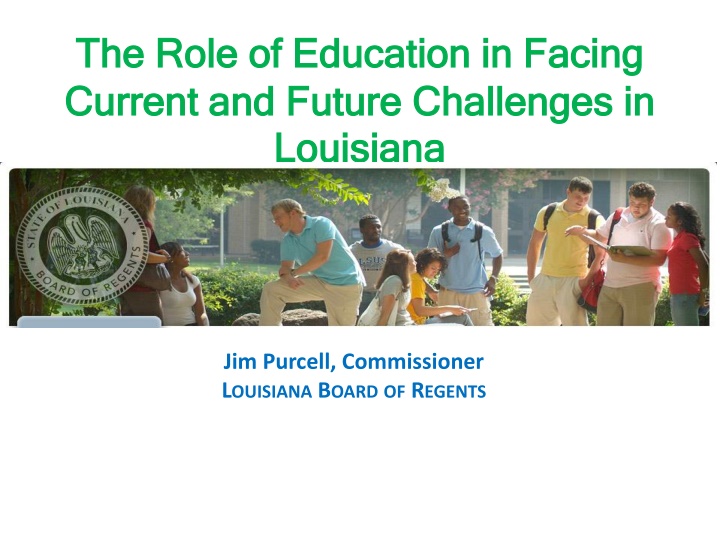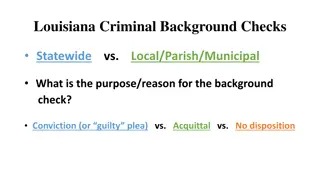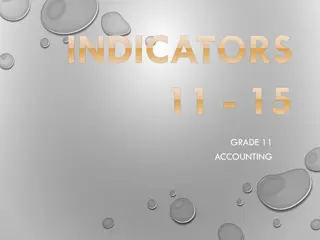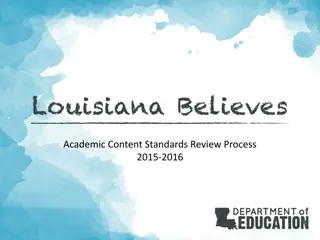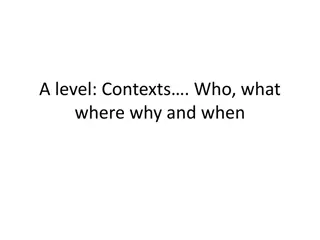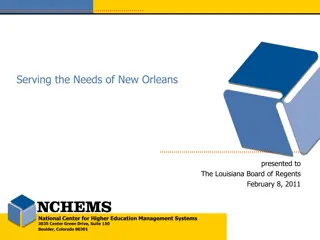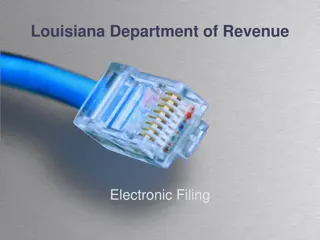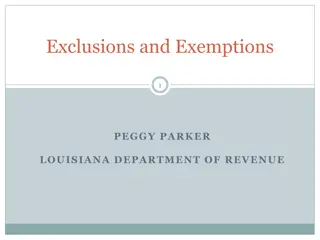Education's Role in Facing Current and Future Challenges in Louisiana
Louisiana's public colleges and universities play a crucial role in addressing the challenges faced by the state. Commissioner Jim Purcell emphasizes the importance of education in overcoming current and future obstacles. Conversations about education, the pragmatics of the workplace, and historical perspectives shed light on the varied approaches to education. The content reflects on different nations' conceptions of education and the practical skills needed for survival. The importance of aligning education with the needs of the community is highlighted through indigenous perspectives.
Download Presentation

Please find below an Image/Link to download the presentation.
The content on the website is provided AS IS for your information and personal use only. It may not be sold, licensed, or shared on other websites without obtaining consent from the author.If you encounter any issues during the download, it is possible that the publisher has removed the file from their server.
You are allowed to download the files provided on this website for personal or commercial use, subject to the condition that they are used lawfully. All files are the property of their respective owners.
The content on the website is provided AS IS for your information and personal use only. It may not be sold, licensed, or shared on other websites without obtaining consent from the author.
E N D
Presentation Transcript
The Role The Role of Education in of Education in Facing Current and Future Current and Future Challenges in Louisiana Louisiana Facing Challenges in Jim Purcell, Commissioner LOUISIANA BOARD OF REGENTS
Louisianas Public Colleges and Universities LSU Health Sciences Center - Shreveport Bossier Parish Community College Louisiana Tech University Grambling State University University of Louisiana Monroe Louisiana Technical College (7 colleges statewide) Louisiana Delta Community College Southern University- Shreveport LSU - Alexandria Louisiana State University Southern University LSU-Shreveport Northwestern State University Baton Rouge Community College Southeastern Louisiana University McNeese State University University of New Orleans SOWELA Technical Community College LSU - Eunice Fletcher Technical Community College Delgado LSU Health Sciences Center - New Orleans Community College River Parishes Community College South Louisiana Community College Southern University Nunez New Orleans Nicholls State University Community College University of Louisiana Lafayette
Conversations about education and the pragmatics of the workplace The Indians of the Six Nations to William & Mary College --1744
We are convinc'd, therefore, that you mean to do us Good by your Proposal; and we thank you heartily. But you, who are wise, must know that different Nations have different Conceptions of things; and you will therefore not take it amiss, if our Ideas of this kind of Education happen not to be the same with yours. We have had some Experience of it. Several of our Young People were formerly brought up at the Colleges of the Northern Provinces; they were instructed in all your Sciences; but, when they came back to us, they were bad Runners, ignorant of every means of living in the Woods, unable to bear either Cold or Hunger, knew neither how to build a Cabin, take a Deer, or kill an Enemy, spoke our Language imperfectly, were therefore neither fit for Hunters, Warriors, nor Counselors; they were totally good for nothing.
We are, however, not the less oblig'd by your kind Offer, tho' we decline accepting it; and, to show our grateful Sense of it, if the Gentlemen of Virginia will send us a Dozen of their Sons, we will take care of their Education; instruct them in all we know, and make Men of them.
Slate.com 40
22% 9.7% 41
A Little History of the World E. H. Gombrich Anyone who owned a mechanical loom could, with the help of one or two assistants perhaps his wife and children do more work than a hundred trained weavers. So whatever became of all the weavers in a town into which a mechanical loom was introduced? . . . they woke up one day to discover that they weren t needed any more. Everything it had taken them years to learn, first as apprentices and then as journeymen, was useless. Compression of wages Restructuring of the economy Those that adapt flourish Those that could not . . . 42
In 1970, 74% of the middle class had a high school diploma or less education. In 2007, only 39% of middle class had a high school diploma or less education. Middle Class: Family income range from 35,000 to 91,000
Help Wanted Projections of Jobs and Education Requirements through 2018. Carnevale, Smith and Strohl postsecondary education has become the gatekeeper to the middle class and the upper class
Nationally, 60% of jobs will require a postsecondary credential by 2018. What was said about Louisiana: By 2018, more than 50% of jobs will require a postsecondary credential. Louisiana currently has a workforce with less than half of what will be needed. Unless there are systemic changes, in 2018 Louisiana will:
rank 6thin the nation in the percentage of jobs for high school dropouts; rank 5thin the nation in the percentage of jobs for high school graduates; rank 50thin the nation for jobs requiring an associate degree; rank 45thin the nation in the percentage of jobs for college graduates; rank 47th in the nation in the percentage of jobs for people with graduate degrees and . . .
rank next to last in the percent of Jobs Requiring Postsecondary Education. We are at a turning point. Louisiana has to decide whether to do a better job at educating its people or serve as a great conveniently located source for cheap labor. What is our collective vision of what Louisiana and this region will look like in the future?
State Per Capita Personal Income v. Share of Adult Population with Bachelor's Degree or Higher (2008) DC No state with a low proportion of Bachelor s degrees has a high per capita income. $38,000 $36,000 CT $34,000 NJ MD MA $32,000 Per Capita Income $30,000 VA NY NH DE $28,000 RI MN CA AK IL CO $26,000 WA VT NV No state with a high proportion of Bachelor s degrees has a low per capita income. MIWI IA MO FL WY PA HI ME AZ GA $24,000 OR KS IN OH NC NE ND $22,000 TN TX SD MT AL SC UT KY NM $20,000 OK AR LA ID WV $18,000 MS $16,000 15% 20% 25% 30% 35% 40% 45% 50% Percentage of Adult Population with a Bachelor's Degree or Higher Source: U.S. Census Bureau, ACS 2006 48
Current percentage of young adults (25-34) with a college degree3 53% 55% 50% 45% 40% 35% 28% 30% 25% 20% 15% 10% Ohio Wyoming Texas Virginia Illinois Alabama Mississippi Kansas Idaho Missouri Colorado Minnesota Louisiana Pennsylvania Nebraska Kentucky Indiana Rhode Island South Dakota Iowa Nevada South Carolina Montana Washington Hawaii Alaska Tennessee Delaware Maine Michigan Vermont Arkansas Oklahoma Arizona Florida Utah Wisconsin Maryland Massachusetts West Virginia New Mexico California Oregon Connecticut New Hampshire North Dakota Georgia North Carolina New Jersey New York 3 College degree means an associate degree, bachelor s degree, or higher. National Center for Higher Education Management Systems (NCHEMS), 2008 (from U.S. Census Bureau, 2008 American Community Survey Public Use Microdata Sample File.) http://www.higheredinfo.org 49
La. given F in skilled workers Advocate business writer The number and quality of skilled workers in Louisiana is dismal, according to a recent report evaluating the state s manufacturing abilities. The 2011 Manufacturing and Logistics National Report by the Center for Business and Economic Research at Ball State University in Indiana gave Louisiana a failing grade in the important area of human capital. All 50 states were included in the study.
